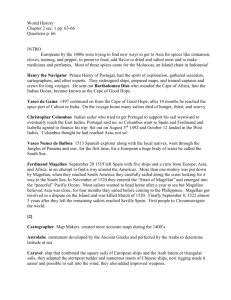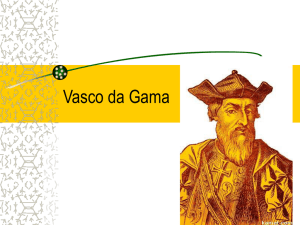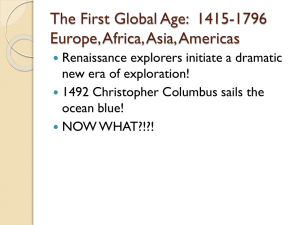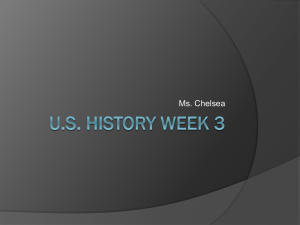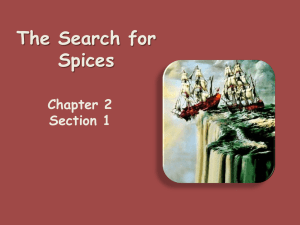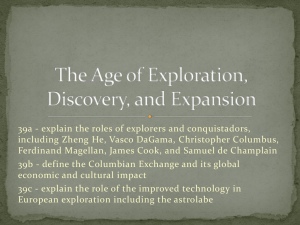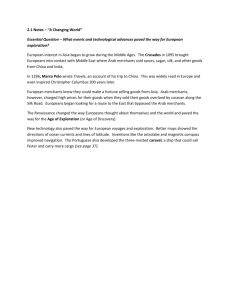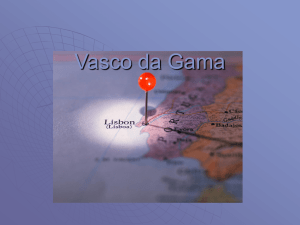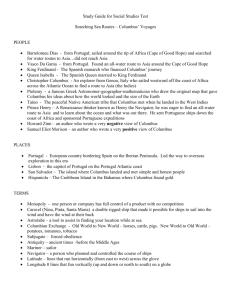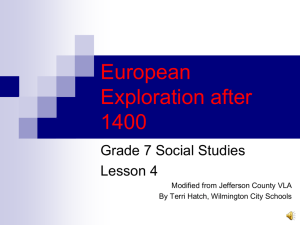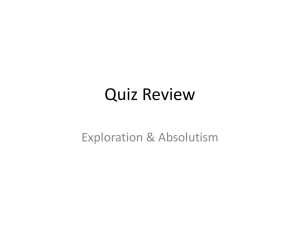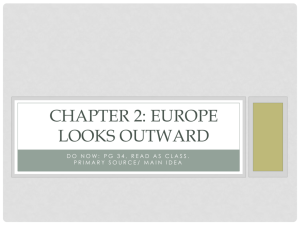1. The Search for Spices
advertisement
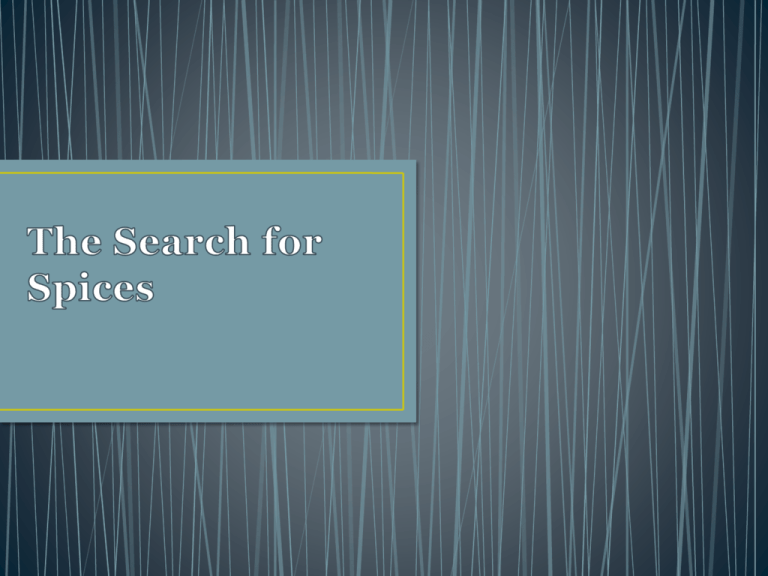
• Understand European motivations for exploring the sea. • Analyze early Portuguese and Spanish explorations • Examine how did Portugal’s eastward explorations lead to the development of a trading empire • Describe European searches for a direct route to Asia. • As Europe’s population recovered from the Black Death, the demand for trade goods grew. • Crusades added luxury goods and demand increases • Europeans wanted spices. • European merchants wanted direct route to Asia. • Some voyagers still wanted to crusade against the Muslims. • Others were inspired by the Renaissance spirit to learn about distant lands. • Preserve food • Add flavor to meat • Make medicine and perfume. • Primary source of spices – Moluccas or Spice Islands in modern day Indonesia. • Italian & Muslim merchants controlled trade routes between Europe and Asia. Hartman Astrolabe (1532) Used to measure the angles of the sun and stars above the horizon and determined latitude. Mariner’s Compass First used by the Chinese, showed direction Sextant Using the height of the stars above the horizon to determine latitude and longitude Cartography More accurate maps and charts Caravel A new lighter, faster ships that combined the square sails of the Europeans with triangular sails of Arabs. Could travel long distance. • Led by Prince Henry “The Navigator,” Portugal expanded and explored along the coast of Africa. • Created a school for sailors and the first organized trip to sail around Africa and on to the east. • Henry gathered cartographers and scientists. • They redesigned ships, trained sea captains, and prepared maps. • Henry inspired explorers and sponsored voyages. • Portugal hoped to Christianize the Africans and find a route to Asia. • Believed if they could control Africa they could get to the sources of spice the Muslims and Italians controlled. • Bartholomeu Dias • In 1488, Bartholomeu Dias rounded the southern tip of Africa, later called the Cape of Good Hope because it opened way for sea route to Asia. • Vasco da Gama • First to establish a sea route to India from Europe. • In 1497, Vasco da Gama reached the spice port of Calicut in India. • In his first trip lost 2/4 ships and most of his sailors died (18/250 survived) due scurvy – A disease caused by the lack of vitamin C. • The Portuguese seized key ports around the Indian Ocean to create a vast trading empire and become a world power. 1488 – Bartholomeu Diaz rounded the southern tip of Africa. 1490 – Vasco de Gama sailed around Africa and after 10 months reached India. Vasco de Gama later helped Portugal claim a vast trading network. • Christopher Columbus – explored a western route to the Indies. • An Italian Catholic from Genoa • He knew the world was round made two mistakes: • Underestimated the circumference • Did not account for two continents • On August 3, 1492 he sailed west from Spain with three ships. • Portugal refused to sponsor him. • Columbus persuaded King & Queen of Spain to finance the journey. • Granted Columbus three ships to find a shorter route to Asia • Nina • Pinta • Santa Maria • He reached the Caribbean Islands thinking he was in the Indies. • First encounters • Good relation soon evaporated. • Conquistadors: conquerors • Carried disease: • Small Pox • 90% population died. • Hernan Cortés • Landed on the Mexican coast in 1519. • Cortés arranged alliances with discontented neighbors who hated the Aztec. • The Aztec emperor, Moctezuma thought Cortés the Aztec god Quetzalcoatl. He offered tribute to Cortés and welcomed him to Tenochtitlán. • When relations grew strained, the Aztecs drove the Spanish out of Tenochtitlán. • In 1521, Cortés returned and captured and demolished Tenochtitlán. • Pizarro in Peru - 1532 • Was inspired by Cortez. • Pizarro lied and used trickery to destroy the Incas. • Using Incan allies just like Cortez, Pizarro slaughtered thousands of natives and took Atahualpa (their leader) prisoner for a ransom. • Reasons for Victory • Superior military technology • Divisions and discontent among the Native Americans • Disease • The Western Hemisphere was named “America” in 1507 by German cartographer Martin Waldseemüller • Italian sailor Amerigo Vespucci wrote reports about the “New world” • Mapmaker labeled region America • Islands Columbus explored became known as West Indies • When Columbus returned, Spain and Portugal both rushed to claim the lands Columbus had explored. • Line of Demarcation- Established by Pope Alexander VI. • East of line belonged to Portugal, West belonged to Spain. • In 1513, Spanish explorer discovered a passage though Panama to the Pacific Ocean – he called it the South Sea. • Maps the Eastern side of South America • Rounds the tip of South America - 1520 • named the strait of Magellan • Magellan crosses the Pacific and lands in the Philippines – March 1521 • Magellan befriends a local leader and helps him fight a war with their neighboring tribe • Magellan died in the fighting • Returned to Spain • The first crew to circumnavigate the globe Circumnavigate – travel around the world • English, Dutch & French searched for a northwest passage to Asia • John Cabot discovered Newfoundland. Claimed it for England • Jacques Cartier explored the St. Lawrence River. • Henry Hudson sailed for the Dutch, explored what would become known as the Hudson River.
